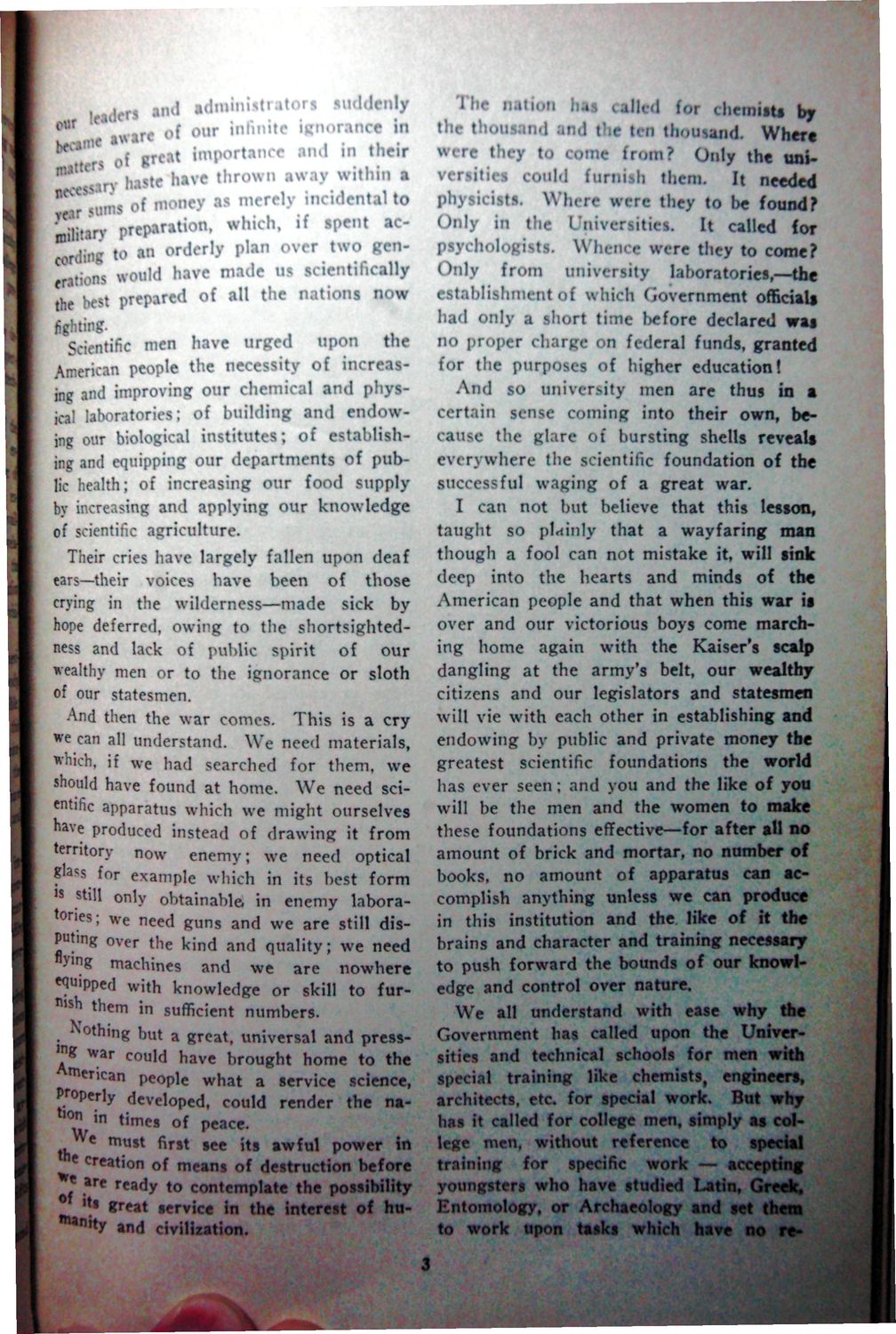| |
| |
Caption: War Publications - WWI Compilation 1923 - Article 17
This is a reduced-resolution page image for fast online browsing.

EXTRACTED TEXT FROM PAGE:
ders •* t |Wtri beCt,,lC and admhiMi i t o n suddenly of our Infinite ignorance in i P° m rtanrc aiuI in thcir I he Mtiofl has called for chemists by the thousand and the ten thousand. Where f n » ? Only the uni. rsit . , ,, .!•; ; .;:., h tbca. It needed physicists. Where were they to be found? 0 n , y in tl,c Universities. It called for Psychologists. Whence were they to come? Only from university laboratories,—the establishment of which Government officials had only a short time before declared was no proper charge on f leral funds, granted for the purposes of higher education I And so university men are thus in a certain sense coming into their own, because the glare of bursting shells reveals everywhere the scientific foundation of the successful waging of a great war. I can not but believe that this lesson, taught so plainly that a wayfaring man though a fool can not mistake it, will sink (loc int P o the hearts and minds of the American people and that when this war is over and our victorious boys come marching home again with the Kaiser's scalp dangling at the army's belt, our wealthy citizens and our legislators and statesmen will vie with each other in establishing and I endowing by public and private money the greatest scientific foundations the world has ever seen; and you and the like of you will be the men and the women to make these foundations effective—for after all no amount of brick and mortar, no number of books, no amount of apparatus can accomplish anything unless we can produce in this institution and the. like of it the brains and character and training necessary to push forward the bounds of our edge and control over nature. We all understand with ease why the Government has called upon the Universities and technical schools for men with special training like chemists, engineers, architects, etc. for special work. But why has it called for college men, simply as col* lege men, without reference to special training for specific work — accepting youngsters who have studied Latin, Greek Entomology, or Archaeology and set them to work upon tasks which have no re3 wcrc ihc of K rcat y t0 come ^ . i neCtS ^ums of money as merely incidental to ration w h i c h if 8 p c n t a c "torn preP* ' » t0 an o r d c r , y p l a n o v c r t w 0 gcn "rdhf ~ Nations would have made us scientifically the best prepared of all the nations now lighting. Scientific men have urged upon the American people the necessity of increasfag and improving our chemical and physical laboratories; of building and endowing our biological institutes; of establishing and equipping our departments of pubIk health; of increasing our food supply by increasing and applying our knowledge of scientific agriculture. Their cries have largely fallen upon deaf cars—their voices have been of those crying in the wilderness—made sick by hope deferred, owing to the shortsightedness and lack of public spirit of our wealthy men or to the ignorance or sloth of our statesmen. And then the war comes. This is a cry we can all understand. We need materials, which, if we had searched for them, we should have found at home. We need scientific apparatus which we might ourselves have produced instead of drawing it from territory now enemy; we need optical gla^s for example which in its best form ls still only obtainable, in enemy laboralories; W e need guns and we are still disputing over the kind and quality; we need ywg machines and we are nowhere dipped with knowledge or skill to furn,s h them in sufficient numbers. Nothing but a great, universal and pressJ * war could have brought home to the m encan people what a service science, ro P Perly developed, could render the nat,0 « in times of peace. thc . P° creation of means of destruction before Wf arc ready to contemplate the possibility !t ™ « great service in the interest of hu^ " t y and civilization. m USt first §cc its awful wcr in
| |